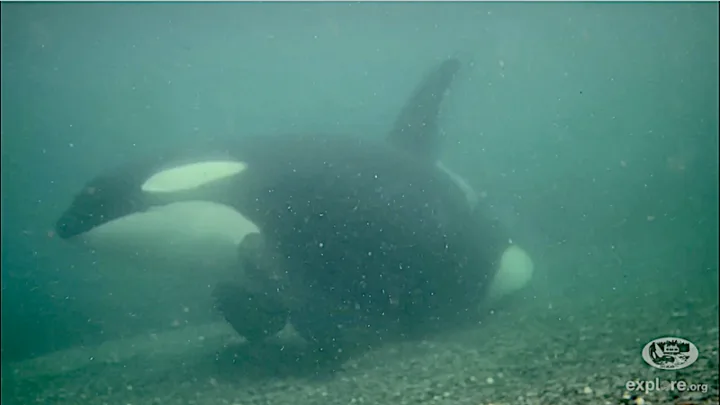Is researching and studying Orcas one of your dream jobs? For Girls that Scuba member Suzie Hall her dream came true when she went to work with Orca Lab in Vancouver Island, here’s she tells us more about what is involved in her job, and the interactions they get with the orcas.
My role as an Orcalab assistant in Canada
“Get out of the water – the orcas are on their way!” was perhaps the most alarming cry I’ve ever heard upon surfacing from a dive. I had just finished our new camera installation in the nick of time, and a group of Northern Resident orcas was only five minutes away from their unique rubbing beaches in Johnstone Strait, British Columbia. This is the only population of orcas known to exhibit this intriguing behaviour: rubbing their entire bodies across the smooth stones of these shallow beaches, often for hours on end. I had been dawdling slightly, waiting for an opalescent nudibranch to move out of the way before I bolted the camera to the rock. With the camera installed, we made it out of the orcas’ way in good time, and the nudibranch was undisturbed. Win-win.
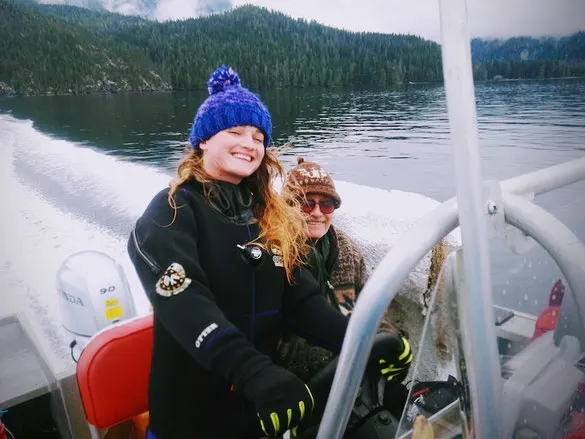
Orcalab is stationed on an otherwise uninhabited island off the north-east coast of Vancouver Island, and has been passively watching and listening to whales and dolphins for five decades. Our network of remote hydrophones and cameras allows us to witness these beautiful cetaceans without disturbing their behaviour: we monitor everything from back at the lab. When we do need to access our remote sites, the work is carefully planned around the movements of the orcas so as to not disturb them. Indeed – ours may well be the only boat on the water actively trying not to see whales!
Due to the remote, passive nature of the work, SCUBA diving has played an increasingly important role over the years. In 2017, I somehow landed in my dream world, combining my love of orcas and diving to further the research and conservation efforts of Orcalab. Since then, I have returned year after year to carry out this unique and fulfilling work. (In fact, due to Covid-19, I was recently “stuck” here for a whole year – but that is its own intriguing story…)
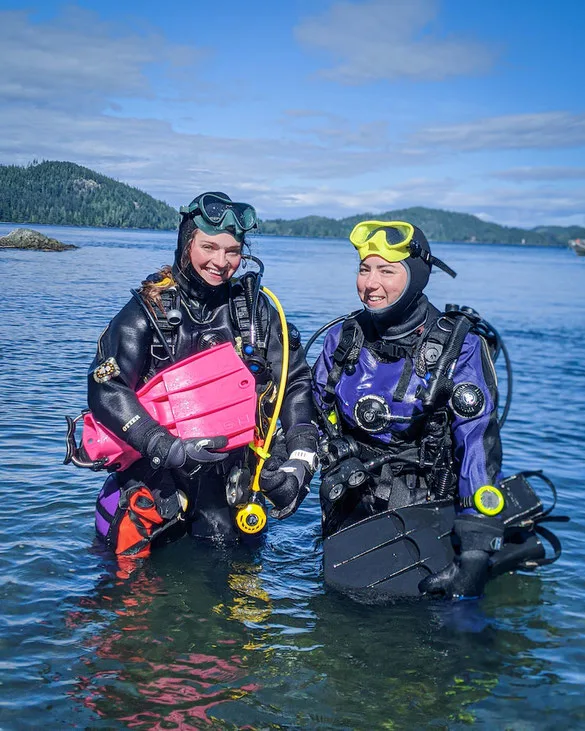
The water temperature around the lab is usually about 7C (45F), making drysuits the obvious choice when donning SCUBA gear. The work to be done is always varied, and no two dives are ever the same: fixing mooring lines; running cables; scouting hydrophone locations; cleaning cameras; affixing brackets and bolts to rocks… the list really is endless! The waters of BC are some of the most beautiful in the world. Colour and life erupt around every corner, and I always remember to take some “me time” once the task at hand is completed, to enjoy this bountiful paradise.
In early 2020, we installed several new top-of-the-line digital hydrophones as part of a coast-wide initiative. I and my best dive buddy Megan – seasoned Orcalab assistant and wildlife videographer – were on-hand to help with the underwater installations. Diving into the world of the orcas is always a thrill. The ‘rubbing beaches’ lie within the Michael Bigg Ecological Reserve and it is prohibited to access them via land or to approach within one kilometre at sea. We are incredibly fortunate to have a permit to allow us to enter and work on our systems, but we always endeavour to be there when the orcas are not. As such, we are part of only a handful of divers who have had the honour of experiencing these dive sites first-hand; something I must regularly reinforce whenever I start to feel ungrateful in life.
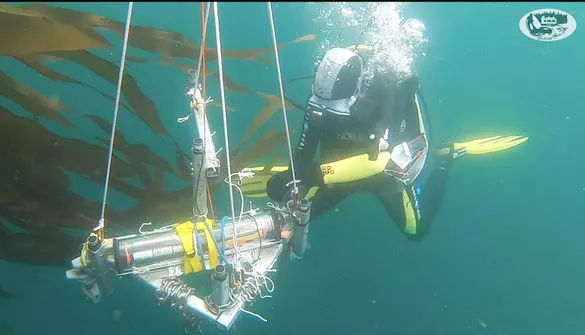
Can you scuba dive with the Orcas?
A question I am often asked is: “Do you dive with orcas? Do you get to see them underwater?” and the answer is always a firm, “No”. The passive research ethics that Orcalab have adopted over the past 50 years are truly exceptional, and I am so very happy to be part of a team which values non-invasive research methods; it is a marvel that they have captured so much incredible data and footage entirely from land! Of course, I am always looking over my shoulder because these are wild places teaming with marine life, and fins do occasionally pop up out of the blue… But, in truth, if I did ever meet an orca underwater I would likely forget all skills and training and follow it to the depths – so it is probably best if I never encounter one…
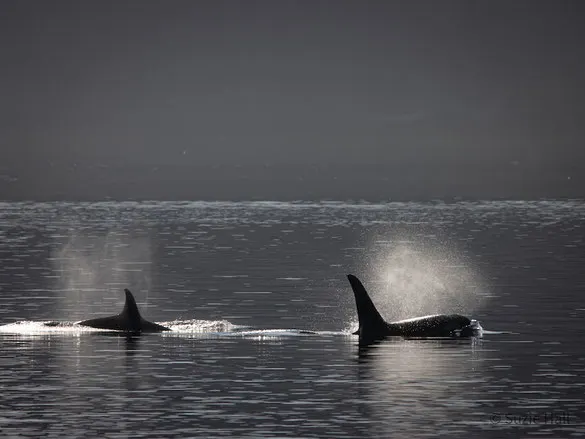
A core part of Orcalab’s mission is to share the lives of these incredible beings with the wider world. Since the early 2000s, they have been live-streaming their hydrophone audio online, and in 2012 they partnered with wildlife camera platform Explore.org to live-stream the visual feeds too. July to September is the best time to tune-in to experience the orcas, and is it highly likely that you will see or hear them every single day. That being said, each season is a world unto itself and you never know what you might see or hear at any point.
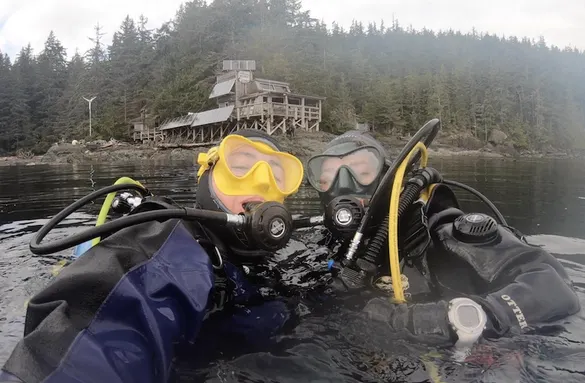
Being part of this small team is incredibly rewarding. The days are long and the diving is often exhausting, but there is nothing else I would rather be doing with my time. Diving has enabled me to contribute to a cause so much bigger than myself, and help Orcalab bring the joyous world of orcas, humpbacks and sea lions to a global audience.
To learn more about Orcalab, please visit www.orcalab.org and follow us on Facebook and Instagram for some seriously amazing footage. Listen live to our audio at www.orca-live.net, and watch live orcas and other incredible animals at www.explore.org. Right now (September to spring), you can see tens of giant Steller sea lions hauled out on our nearby rock – do come and join us!
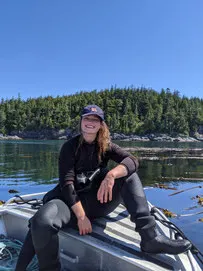
About the Author
Suzie is a self-confessed orca nerd and all-round ocean lover. After learning to dive at university in the UK, she has since moved to Canada to pursue her love affair with whales further. She now spends most of her time at Orcalab, diving at God’s Pocket or learning to master her newly-acquired sailboat (Enthusiasm: 10, Skill Level: 1). Instagram: @awildsuze

